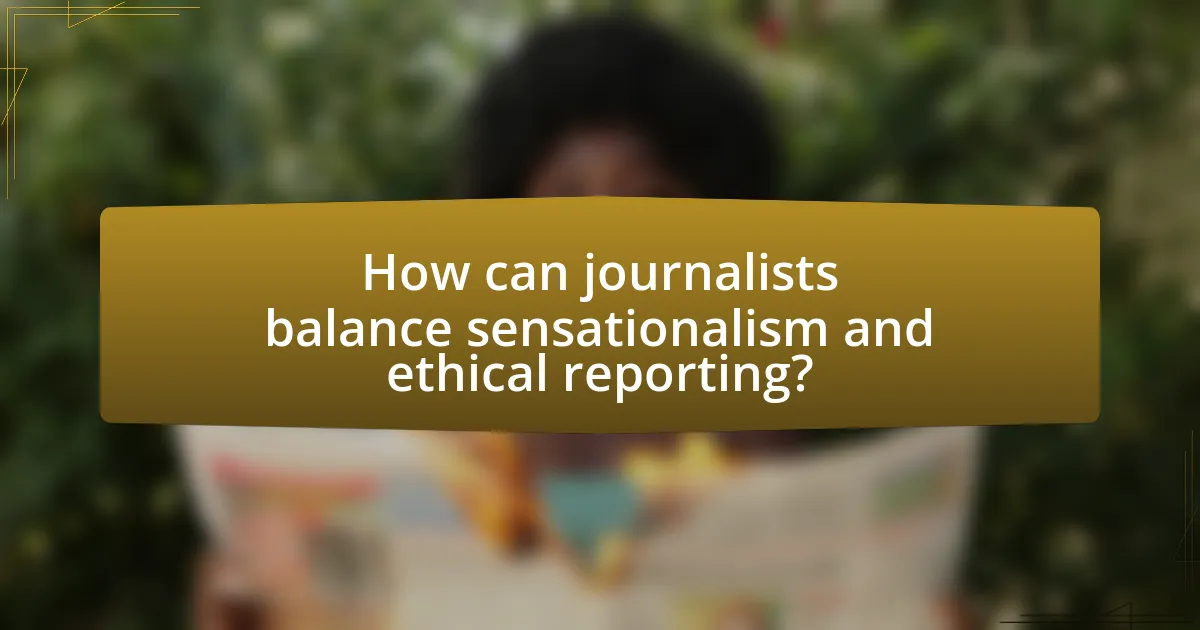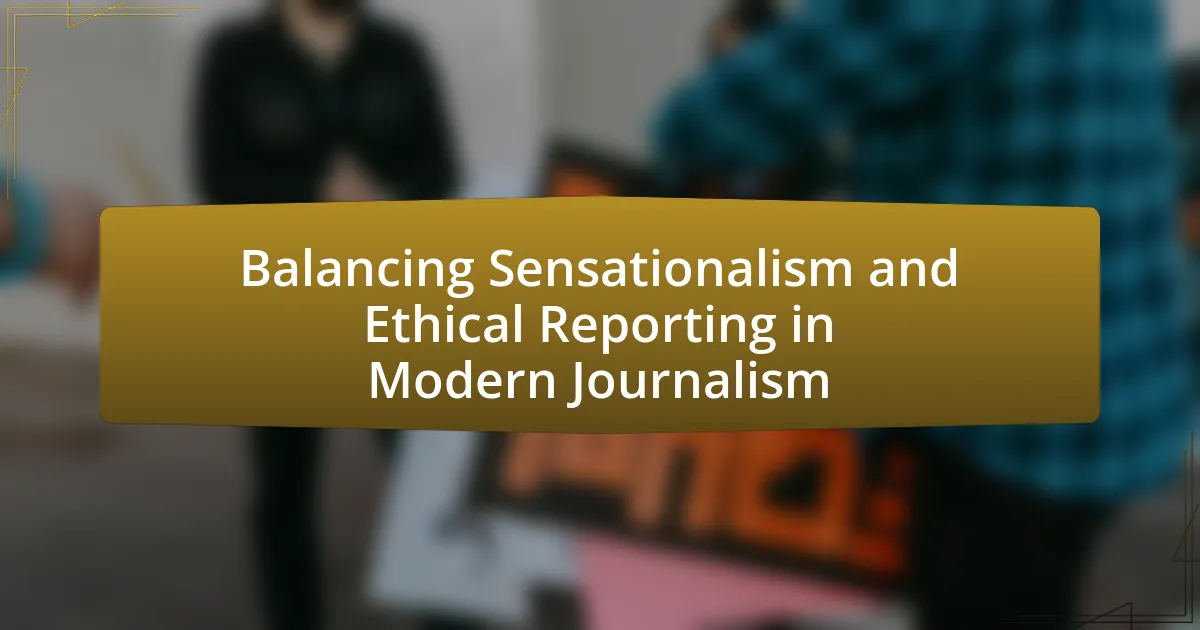The article examines the tension between sensationalism and ethical reporting in modern journalism, highlighting how sensationalism is used to attract audience attention and increase engagement, often at the expense of factual accuracy. It discusses the negative impacts of sensationalism on news reporting, including misinformation and erosion of public trust, as well as the psychological effects on audiences. The article also explores the economic pressures and competition that drive sensationalist practices, while emphasizing the importance of ethical standards in journalism, such as accuracy, fairness, and accountability. Additionally, it outlines best practices for journalists to balance engagement with ethical reporting, ensuring that the integrity of journalism is maintained.

What is the role of sensationalism in modern journalism?
Sensationalism in modern journalism serves to attract attention and increase audience engagement, often prioritizing dramatic storytelling over factual accuracy. This approach can lead to heightened emotional responses from the audience, which may drive higher viewership and readership numbers. For instance, studies have shown that headlines with sensational language can significantly boost click-through rates, as evidenced by a 2018 analysis from the Pew Research Center, which found that sensational headlines often outperform straightforward reporting in terms of audience engagement. However, this practice can compromise journalistic integrity and contribute to misinformation, as sensationalized stories may distort facts to create a more compelling narrative.
How does sensationalism impact news reporting?
Sensationalism negatively impacts news reporting by prioritizing dramatic and exaggerated narratives over factual accuracy. This approach can lead to misinformation, as sensationalized stories often distort reality to attract attention, resulting in a misinformed public. For instance, a study published in the Journal of Communication found that sensationalist headlines significantly increase reader engagement but also contribute to a decline in trust in media sources. This erosion of trust can diminish the credibility of journalism as a whole, making it challenging for audiences to discern reliable information from sensationalized content.
What are the psychological effects of sensationalism on audiences?
Sensationalism significantly impacts audiences by heightening emotional responses and altering perceptions of reality. Audiences exposed to sensationalized content often experience increased anxiety, fear, and distrust, as sensationalism tends to exaggerate risks and present information in a misleading manner. Research indicates that sensationalized news can lead to desensitization, where individuals become numb to real issues due to constant exposure to extreme portrayals. Additionally, studies show that sensationalism can create a skewed understanding of social issues, as audiences may prioritize sensational stories over more critical but less dramatic news, ultimately affecting public opinion and behavior.
How does sensationalism influence public perception of news events?
Sensationalism significantly influences public perception of news events by amplifying emotional responses and shaping narratives that prioritize shock value over factual accuracy. This approach often leads to heightened public interest and engagement, as sensationalized stories tend to attract more attention than straightforward reporting. For instance, studies have shown that headlines featuring sensational language can increase click-through rates by up to 63%, demonstrating how sensationalism can distort the public’s understanding of events by framing them in a more dramatic light. Consequently, this can result in misinformed opinions and skewed perceptions, as audiences may focus more on the sensational aspects rather than the underlying facts.
Why do journalists resort to sensationalism?
Journalists resort to sensationalism primarily to attract audience attention and increase engagement. In a competitive media landscape, sensationalism often leads to higher viewership and readership, as emotionally charged stories tend to resonate more with the public. For instance, a study by the Pew Research Center found that headlines with sensational elements significantly increase click-through rates, demonstrating that sensationalism can effectively drive traffic and boost ratings. This practice, while effective for immediate engagement, raises ethical concerns regarding the accuracy and integrity of reporting.
What economic pressures drive sensationalist reporting?
Economic pressures that drive sensationalist reporting include the need for increased advertising revenue and audience engagement. Media outlets often prioritize sensational stories to attract viewers and readers, as higher engagement leads to more advertising dollars. For instance, a study by the Pew Research Center found that sensational headlines significantly increase click-through rates, which directly correlates with revenue generation. Additionally, the competitive landscape of digital media compels news organizations to adopt sensationalist tactics to maintain relevance and market share, further exacerbating the trend.
How does competition among media outlets contribute to sensationalism?
Competition among media outlets contributes to sensationalism by driving journalists to prioritize attention-grabbing stories over factual reporting. This competitive pressure often leads to the exaggeration of events, emotional manipulation, and the use of provocative headlines to attract viewers and readers. For instance, a study by the Pew Research Center found that 62% of Americans believe that news organizations prioritize sensational stories over factual accuracy, highlighting the impact of competition on journalistic integrity. As media outlets strive to capture audience share in a crowded market, sensationalism becomes a tactic to stand out, ultimately compromising the quality of information disseminated to the public.

What constitutes ethical reporting in journalism?
Ethical reporting in journalism is characterized by accuracy, fairness, and accountability. Journalists must ensure that their information is fact-checked and sourced from credible outlets to maintain accuracy. Fairness involves presenting multiple viewpoints and avoiding bias, which is essential for balanced reporting. Accountability requires journalists to take responsibility for their work, including correcting errors and being transparent about their sources and methods. The Society of Professional Journalists’ Code of Ethics outlines these principles, emphasizing the importance of minimizing harm and acting independently, which reinforces the validity of these ethical standards in journalism.
How do ethical standards guide journalistic practices?
Ethical standards guide journalistic practices by establishing principles that promote accuracy, fairness, and accountability in reporting. These standards, such as those outlined by the Society of Professional Journalists, emphasize the importance of truthfulness and minimizing harm, which helps journalists navigate the tension between sensationalism and responsible reporting. For instance, adherence to ethical guidelines has been shown to enhance public trust in media, as studies indicate that audiences are more likely to engage with news sources that prioritize ethical considerations over sensational content.
What are the key principles of ethical journalism?
The key principles of ethical journalism include accuracy, fairness, independence, accountability, and transparency. Accuracy ensures that information is correct and verified before publication, which is essential for maintaining trust with the audience. Fairness involves presenting all sides of a story without bias, allowing for a balanced perspective. Independence requires journalists to avoid conflicts of interest and remain free from outside influences, ensuring that their reporting is objective. Accountability means that journalists must take responsibility for their work and correct any errors promptly. Transparency involves being open about sources and methods, which fosters credibility and trust with the audience. These principles are foundational to maintaining integrity in journalism and are widely recognized by professional organizations such as the Society of Professional Journalists.
How do ethical guidelines vary across different media organizations?
Ethical guidelines vary significantly across different media organizations, reflecting their unique values, audience expectations, and operational contexts. For instance, traditional news outlets like The New York Times adhere to strict journalistic standards that emphasize accuracy, fairness, and accountability, often guided by the Society of Professional Journalists’ Code of Ethics. In contrast, digital platforms such as BuzzFeed may prioritize engagement and shareability, leading to more flexible interpretations of ethical standards, particularly in sensationalism and clickbait practices. This divergence is evident in how each organization handles issues like sourcing, fact-checking, and the balance between public interest and sensational reporting, showcasing the broader spectrum of ethical considerations in modern journalism.
Why is ethical reporting important for society?
Ethical reporting is crucial for society because it fosters trust between the media and the public, ensuring that information disseminated is accurate and responsible. When journalists adhere to ethical standards, they provide a foundation for informed decision-making among citizens, which is essential for a functioning democracy. For instance, a study by the Pew Research Center found that 62% of Americans believe that news organizations should be held accountable for the accuracy of their reporting. This accountability not only enhances the credibility of the media but also protects the public from misinformation and sensationalism, which can lead to societal harm.
How does ethical journalism contribute to informed citizenship?
Ethical journalism contributes to informed citizenship by ensuring that the public receives accurate, fair, and comprehensive information. This integrity in reporting fosters trust between the media and the audience, enabling citizens to make well-informed decisions regarding societal issues. For instance, studies have shown that communities with access to ethical journalism experience higher levels of civic engagement and participation in democratic processes, as they are better equipped to understand the implications of policies and events. By prioritizing truthfulness and accountability, ethical journalism empowers citizens to critically evaluate information, thereby enhancing the overall quality of public discourse.
What role does trust play in the relationship between media and the public?
Trust is fundamental in the relationship between media and the public, as it influences audience engagement and perception of credibility. When the public trusts media outlets, they are more likely to consume content, share information, and rely on those sources for news and insights. Conversely, a lack of trust can lead to skepticism, reduced viewership, and the spread of misinformation. Research indicates that 62% of Americans believe that news organizations intentionally mislead the public, highlighting the critical need for transparency and ethical reporting to foster trust. This trust is essential for maintaining a healthy democratic society, as it ensures that citizens are informed and can make decisions based on accurate information.

How can journalists balance sensationalism and ethical reporting?
Journalists can balance sensationalism and ethical reporting by adhering to established ethical guidelines while prioritizing factual accuracy and context. Ethical frameworks, such as the Society of Professional Journalists’ Code of Ethics, emphasize the importance of minimizing harm, seeking truth, and being accountable. By focusing on comprehensive reporting that includes multiple perspectives and avoids exaggeration, journalists can present stories that engage audiences without resorting to sensationalism. Research indicates that audiences prefer accurate and responsible journalism, which fosters trust and credibility, ultimately benefiting both the public and the profession.
What strategies can journalists use to avoid sensationalism?
Journalists can avoid sensationalism by adhering to strict ethical guidelines and focusing on factual reporting. Implementing fact-checking processes ensures that information is accurate and reliable, reducing the likelihood of exaggeration. Additionally, journalists should prioritize context by providing background information that helps audiences understand the significance of events without resorting to hyperbolic language. Training in media literacy can also empower journalists to recognize and resist sensationalist tendencies. Research indicates that adherence to ethical standards in journalism leads to increased public trust and credibility, as seen in studies conducted by the Pew Research Center, which highlight the correlation between ethical reporting and audience perception.
How can fact-checking and verification improve reporting quality?
Fact-checking and verification enhance reporting quality by ensuring accuracy and credibility in news content. When journalists rigorously verify facts before publication, they reduce the likelihood of disseminating misinformation, which can damage public trust. A study by the Pew Research Center found that 64% of Americans believe that misinformation has a significant impact on their understanding of current events. By implementing fact-checking processes, news organizations can provide reliable information, thereby fostering informed public discourse and maintaining journalistic integrity.
What role does audience education play in promoting ethical journalism?
Audience education plays a crucial role in promoting ethical journalism by equipping individuals with the skills to critically evaluate news sources and content. When audiences are educated about media literacy, they become more discerning consumers of information, which reduces the impact of sensationalism and misinformation. Research indicates that media literacy programs can significantly enhance individuals’ ability to identify biased reporting and recognize credible sources, thereby fostering a more informed public. For instance, a study by the American Psychological Association found that media literacy education improved participants’ critical thinking skills regarding news consumption, leading to a greater demand for ethical reporting practices.
What are the challenges in achieving this balance?
The challenges in achieving a balance between sensationalism and ethical reporting in modern journalism include the pressure to attract audience attention while maintaining journalistic integrity. Journalists often face the dilemma of prioritizing engaging content that drives viewership over factual accuracy and responsible reporting. This conflict is exacerbated by the rise of digital media, where metrics such as clicks and shares can overshadow the importance of ethical standards. Additionally, the competitive landscape of news outlets can lead to a culture where sensationalism is rewarded, further complicating the adherence to ethical practices. Studies have shown that sensationalist reporting can distort public perception and undermine trust in media, highlighting the critical need for journalists to navigate these challenges effectively.
How do technological advancements complicate the balance between sensationalism and ethics?
Technological advancements complicate the balance between sensationalism and ethics by enabling rapid dissemination of information, often prioritizing speed over accuracy. The rise of social media platforms allows for immediate sharing of news, which can lead to sensationalized headlines and misinformation spreading quickly, as seen in events like the 2016 U.S. presidential election where false information circulated widely. Additionally, algorithms that prioritize engagement can amplify sensational content, further skewing public perception and undermining ethical reporting standards. This dynamic creates pressure on journalists to produce eye-catching stories, sometimes at the expense of thorough fact-checking and ethical considerations.
What are the consequences of failing to balance sensationalism and ethical reporting?
Failing to balance sensationalism and ethical reporting leads to a loss of public trust in the media. When sensationalism dominates, factual accuracy often suffers, resulting in misinformation that can mislead audiences and distort public perception. For instance, a study by the Pew Research Center found that 62% of Americans believe that news organizations prioritize sensationalism over factual reporting, which undermines the credibility of journalism as a whole. This erosion of trust can diminish the media’s role as a watchdog in society, ultimately harming democratic processes and informed decision-making.
What best practices can journalists adopt for ethical reporting?
Journalists can adopt several best practices for ethical reporting, including verifying information before publication, ensuring accuracy, and maintaining transparency with sources. Verification involves cross-checking facts from multiple reliable sources to prevent the dissemination of misinformation, which is crucial in maintaining credibility. Accuracy is essential; journalists should strive to present information truthfully and avoid exaggeration or sensationalism that can mislead the audience. Transparency with sources fosters trust; journalists should disclose conflicts of interest and provide context for their reporting. These practices align with ethical standards set by organizations such as the Society of Professional Journalists, which emphasizes the importance of accountability and fairness in journalism.
How can journalists effectively engage with their audience while maintaining ethical standards?
Journalists can effectively engage with their audience while maintaining ethical standards by prioritizing transparency and accuracy in their reporting. By providing clear sources and context for their information, journalists build trust with their audience, which is essential for engagement. For instance, a study by the Pew Research Center found that 62% of Americans believe that news organizations should be transparent about their sources, indicating that transparency fosters audience trust. Additionally, journalists can utilize interactive platforms, such as social media, to encourage dialogue and feedback, ensuring that they remain accountable to their audience while adhering to ethical guidelines. This approach not only enhances engagement but also reinforces the integrity of the journalistic process.
What resources are available for journalists seeking to improve their ethical practices?
Journalists seeking to improve their ethical practices can access various resources, including professional organizations, training programs, and ethical guidelines. The Society of Professional Journalists (SPJ) offers a comprehensive Code of Ethics that serves as a foundational resource for ethical reporting. Additionally, the Poynter Institute provides workshops and online courses focused on ethical journalism, helping journalists navigate complex situations. The International Federation of Journalists (IFJ) also publishes guidelines and resources aimed at promoting ethical standards globally. These organizations and their materials are widely recognized and utilized within the journalism community, reinforcing their validity as essential resources for ethical improvement.

Leave a Reply